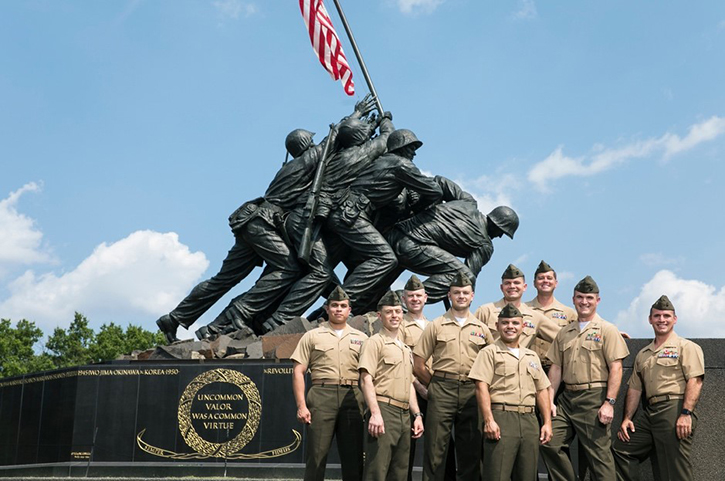
From left, Marine Captains Jose 'Chris’ Romero, Benjamin Leape, Benjamin Broadmeadow, Matt Somers, Jorge "Jay" Hernandez, Josh Culver, Levi Hofts and Adam Link and Major Jason Bowers are the first group enrolled in the USMC Congressional Fellows program at Mason. Photo by Ron Aira
The first students in a new Headquarters Marine Corps program, which makes higher education opportunities available to Marine Corps Officers, began studies in July at the Schar School of Policy and Government at George Mason University.
Nine Marines are enrolled in the Master of Public Policy (MPP) Program, which provides graduates with the skills in policymaking and analysis necessary for understanding and solving critical problems. Once they have earned their degrees they will serve for a year as legislative assistants to members of Congress.
The Schar School’s proximity to the Pentagon, where the officers are stationed, and its favorable cost efficiencies were factors in the Marine Corps Office of Legislative Affairs choosing the Schar School, said Tres Smith, a recently retired Marine lieutenant colonel who chose the students and is teaching one of the courses.
“The adaptability and flexibility to meet our needs and work around the needs of the Marine Corps were important to make this happen," Smith said. "And the curriculum was tailored to what we needed; that’s what sealed the deal for us.”
“This is a great opportunity for Marines to gain higher education,” said Major Jason Bowers, one of the students. “Three of us already have master’s degrees, but this second one for myself allows me an opportunity to do something more focused on what I’ll be doing in the future.”
The advanced degrees are important to the officers if they wish to move up in rank, Bowers said. “As your rank increases, there are additional requirements, and if you want to be competitive, you really need to have a master’s degree,” he said.
They started their studies this summer with PUBP 503 Culture, Organization, and Technology, a 14-week course that was condensed into just six weeks of instruction.
“Because of their background and rigorous training that emphasizes attention to detail, I had no doubt the class would adapt and excel at this advanced pace,” said Rainier A. Sommer, a professor in public policy and enterprise engineering. “I am quite sure that this first cohort will do just as well in all their other program course requirements.”
The officers will also take courses that will prepare them for their work on the Hill by providing instruction and practice on government processes and policy writing, Bowers said. These include classes that emphasize policy analysis, program evaluation and ethical context, said Bonnie Stabile, the research assistant professor who is director of the MPP program.
“The policy analysis answers the question, ‘What should we do?’ The program evaluation answers, ‘How well did we do it?’ And the ethics asks the question, ‘Should we do it?’” she said.
As part of the fellowship, the officers will also attend congressional sessions and meetings on the Hill.
